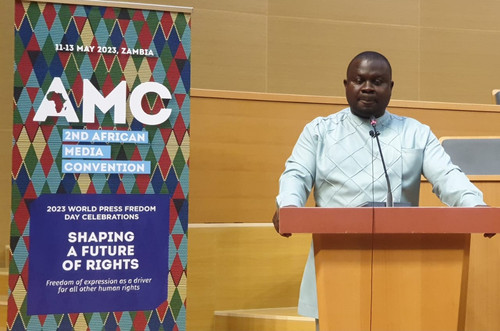- by Admin
- March 12, 2024
Click the link below to join Our WhatsApp group for daily brief on current trends in the country.
Join Here!
Loading

The Third African Media Convention (AMC), an annual gathering dedicated to reflecting on the pivotal role of journalism in Africa, celebrated the fundamental principles of press freedom and discussed measures to safeguard media freedoms.
This year’s event, themed “The African Media We Want: Enhancing Freedom, Innovation, and Environmental Sustainability in a Dynamic Media Landscape,” took place in Ghana for three days from May 15th to 17th and gathered around 2,000 participants from across the continent.
Attendees included policymakers, Ministers of State, academics, researchers, and media practitioners.
Organized by the UNESCO Addis Ababa Liaison Office to the African Union (AU) and the United Nations Economic Commission for Africa (UNECA), alongside the African Union and hosted by Ghana’s Ministry of Information, the Ghana Journalists Association, and various media partners, the convention focused on promoting access to information, ensuring the safety of journalists, and enhancing media viability in AU Member States.
At the podium, the President, Nana Akufo-Addo emphasized the media’s crucial role in promoting sustainable environmental practices in Africa. He highlighted the need for African media to proactively educate the public on climate change issues, particularly targeting the youth to foster environmental sustainability.
“The media must be a catalyst to promote sustainable environmental practices in Africa,” President Akufo-Addo stated.
He dwelt on the importance of mobilizing the public towards collective action, driving innovation, and promoting sustainable environmental practices on the continent. The President also underscored that media freedom is fundamental to the growth and development of any democratic society. Thus, it is crucial for the media to uphold accuracy, integrity, and ethical standards that respect the dignity of all individuals.
President Akufo-Addo noted the impact of media freedom on enhancing public accountability. He pointed to the enactment of the Right to Information Act by his government as a significant step towards deepening Ghana’s democratic agenda, providing citizens with essential content, and ensuring accountable governance.
Moreover, he remarked that media freedom has improved the quality of projects and fostered a culture of transparency, allowing Ghanaians to freely scrutinize government actions, policies, and programs.
“The Ghanaian media is ranked as one of the top countries in the Global Press Freedom Index,” President Akufo-Addo noted. “Today, the media stands at the crossroads of present challenges and opportunities.”
However, he cautioned that media freedom should not merely be the ability to speak or write freely but should also encompass the power to inform and mobilize society for common goals.
Mrs. Akosua Frema Osei-Opare, the Chief of Staff, also addressed the conference, stressing the importance of enhancing the capacity of media practitioners in environmental reporting.
She emphasized the need for timely and accurate information on climate change issues to prevent the spread of false information.
The Chief of Staff called on the media to be ambassadors in raising awareness about climate change crises, highlighting the disproportionate impact on the continent.
She expressed her conviction that the media could play a vital role in influencing public opinion on environmental issues, thereby positively impacting the lives of the people.
Addressing environmental challenges, she added, would require a strict regulatory regime, law enforcement, and effective media education and sensitization campaigns.

Click the link below to join Our WhatsApp group for daily brief on current trends in the country.
Join Here!
0 Comments: